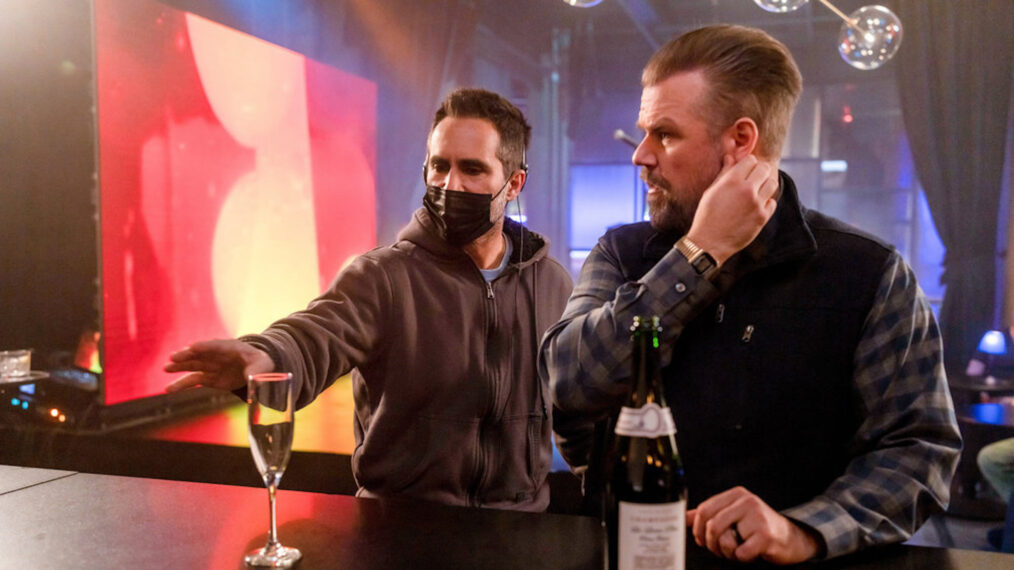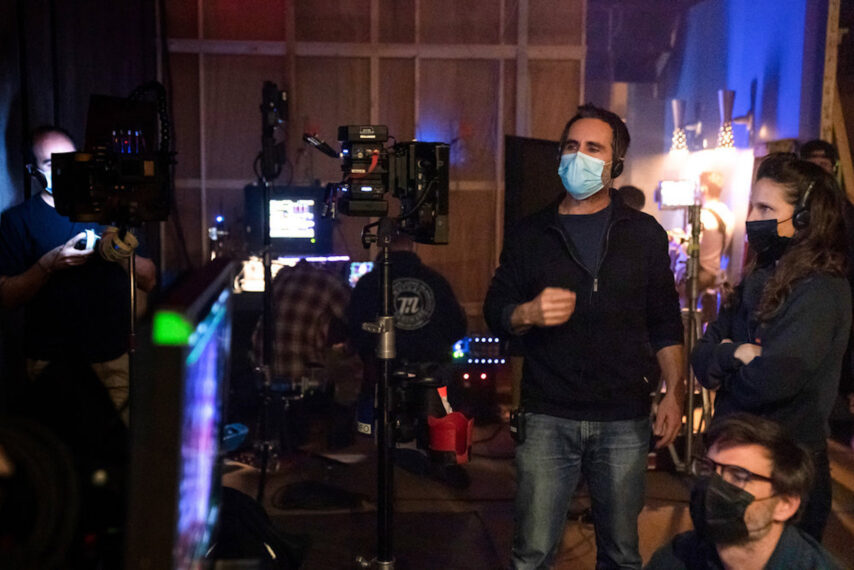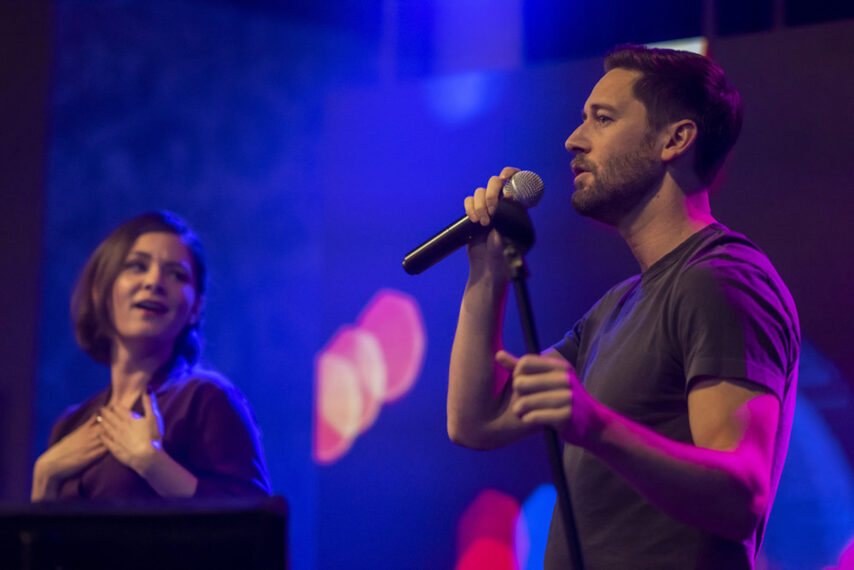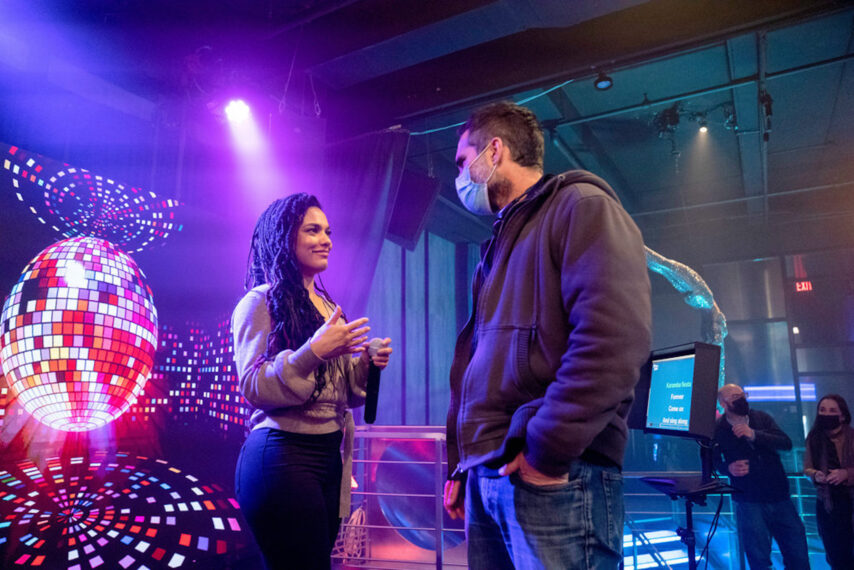
Nestor Carbonell (The Morning Show, Lost) stops by New Amsterdam for the second time in Season 4 to direct, but this time, it’s a very different type of medical drama episode.
In “All Night Long,” the team goes out for a night of karaoke and drinking … and then must face the consequences. While it is a departure, we do see them at work, like Dr. Iggy Frome (Tyler Labine) helping a patient confront a past trauma, and dealing with personal problems, like Dr. Floyd Reynolds (Jocko Sims) and Dr. Lyn Malvo (Frances Turner) discussing their future.
Carbonell takes us inside directing the hour.
You directed an episode earlier in the season, but that one was a bit more straightforward. This one is a bit of a departure from the typical medical drama episode. Preview what we’ll see from the doctors.
Nestor Carbonell: You’re absolutely right. It definitely was a departure from the norm. Like you mentioned, I’d shot one episode, “Seed Money,” in the summer, and there were some fun exteriors there that were sort of atypical as well of the show, but nothing to the extent of what we did on this episode. It was so much fun to get to sort of explore all of the characters — our main characters and also some of our supporting casts, like Gladys [Megan Byrne] — in a way that we hadn’t seen them before and in an environment we hadn’t seen them before, doing things like karaoke that we had never seen them do and really letting loose and then dealing with the repercussions of that the next day. So that was really fun sort of to get out of the hospital in such a big way and to do so many great locations in and around New York, some in Brooklyn, a lot of them in Midtown Manhattan.
Because of that departure and because you’re telling the same night from multiple perspectives, can you talk about your approach to directing as a result?
Laura Valdivia wrote a beautiful script and she plays with time in this episode, the first of a very suspenseful two-parter. You’re right, it reads beautifully, but the challenge in terms of executing is trying to make sure that you know where you are at any different time, where each character is at any different time, how much they know, how much they don’t know. So with the help of Ray [Negron], our incredible first AD, he asked for a chronological timeline that we could work with so that the scenes were in chronological order so we could always refer to it just even through prep: “OK, so this person doesn’t need to be here, they need to be here.” So that was the sort of the logistical challenge, just making sure that we were honest with where everyone was.

Heidi Gutman/NBC
And then in terms of scheduling, it was initially, certain actors aren’t available that day for whatever reason. So it was trying to figure out how we could work that puzzle out in prep and later on when we shot. But it was so much fun.
Then visually there is a vignette in the script, it’s an exterior of a karaoke that you’ll see play throughout the episode, I was trying to come up with a visual way to establish that, and that was fun with a crane in the middle of Midtown Manhattan, all the logistical fun things that entails — and in the middle of blizzard, no less. So we had to contend with that, which is fun. I say fun lightly. It was dangerous, but we thankfully got it. We were able to execute it and everybody got home safely.
I loved seeing everyone leaving outside the bar. I loved the way you did that shot.
Oh, thanks so much. That was fun and it was an ambitious piece in that I wanted to start with the same sort of tableau to establish, OK, this is the repetitious element of the scene, and then push down on each individual character to get their perspective on wherever they go afterwards. So that was fun, but yeah, that was a credit to the crew for executing it so beautifully, and this is in the middle of a blizzard on a Friday night where we had a hard out at 9:00 p.m. because of this blizzard. But thankfully they were just brilliant, as was the cast, and we were able to get it done.

Zach Dilgard/NBC
What was your favorite scene to direct?
That whole sequence was fun just because I think it was a departure for New Amsterdam, and I could feel the crew was really excited about [it]. There’s so many elements of this episode that to me were novel because I hadn’t gotten to do a lot of special effects, a lot of stunts — there’s a stunt I got to do.
But the opening scene for me was a lot of fun in that it’s a oner, for the most part — the whole first half of that is a oner, handheld, and it’s disorienting initially. You don’t know where you are, you’re panning to people, and they’re all in emotional and physical states that we had never seen them before, and coming up with that shot and designing it, as I was helping to design the karaoke bar, because that that was not a karaoke bar, we had to sort of figure that out. So I designed the karaoke bar really to favor that opening shot, and so that was a lot of fun to shoot.
But there’s so many. Shooting the exterior of a building that our art department constructed inside a sound stage, the three stories, phenomenal job that they did, shooting a stunt there was extraordinary. Every day was a joy, getting to do many, many things as a director that I’d never done before.

Heidi Gutman/NBC
So was Max [Ryan Eggold] and Wilder’s [Sandra Mae Frank] karaoke song in that opening your favorite to direct? Or was it another song?
That was a lot of fun. They were amazing, and they worked so well together. They were great, but they all were good. Casey [Alejandro Hernandez] was so much fun with Bloom [Janet Montgomery]. Not everybody was scripted to do duets, I think only Wilder and Max [were].
Freema [Agyeman] asked to see if she could do a duet. And I was like, “No, no, no, I think you really need to do a solo.” She was the only one, and she was so much fun to shoot. I told her, “Don’t worry, it’s gonna be great.” And she really went for it, and she was phenomenal. She’s always amazing, but she really went for it, and so that was so much fun to shoot. I even kept the camera rolling to get the crowd reaction. We panned to the crowd and even though it’s not scripted, we ended up using that shot in the edit because it was just so much fun seeing the entire New Amsterdam team sort of singing along with her. But I think shooting Freema’s was especially fun because she was petrified of going up there and singing alone. And they’re all great singers. But she was mortified and she really took a big swing and she was amazing.
Without spoiling anything, since we know this is a two-parter, you’re also building up to an ending that sets up a second episode. How did you approach directing that?
Yeah, in a suspenseful or a mysterious part of a two-parter, you never want to tip anything that’s gonna give away any element of the mystery, so I think a lot of it was that, and also setting up locations so that the next episode could work visually as well. That was part of the challenge as well. Some of that is the way you cast and then also the way you direct actors because you never wanna play the end of the scene when you’re in the beginning of a scene, but you certainly never wanna play the ending of a two-part mystery as you’re acting in the first part.
Then also red herrings, ways to push mystery visually, with dollies coming around corners, with POV shots. This is stuff that I thankfully was able to learn from Tucker Gates while I worked on Bates Motel and I had an opportunity to direct on that show — that’s where I started — how to push tension visually, point-of-view perspectives and camera movement, how to come around a corner with pushing camera, pulling an actor towards you, and then also expressing a POV. Those are the things that were really fun to do that New Amsterdam doesn’t normally do because typically they’re inside at the hospital. So it was a really a fun opportunity to push mystery.
New Amsterdam, Tuesdays, 10/9c, NBC







